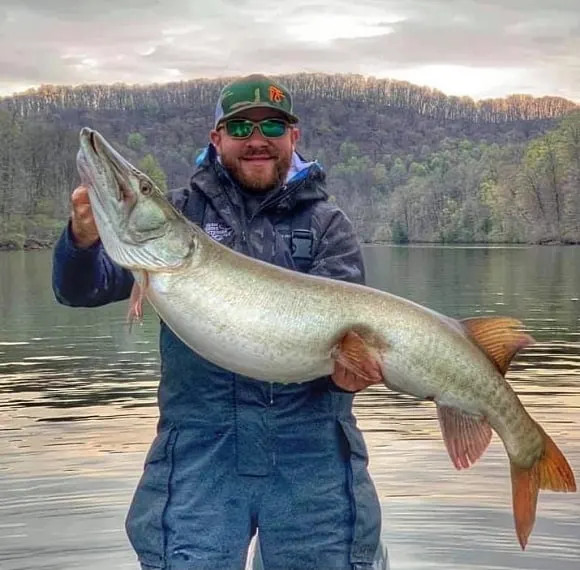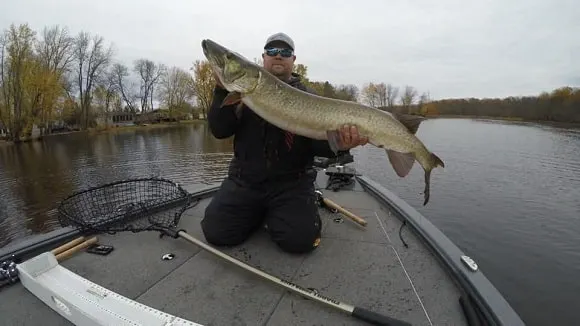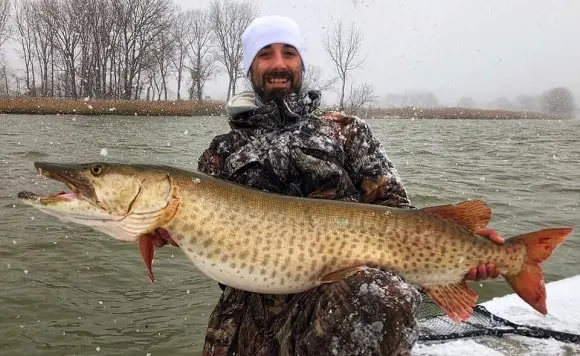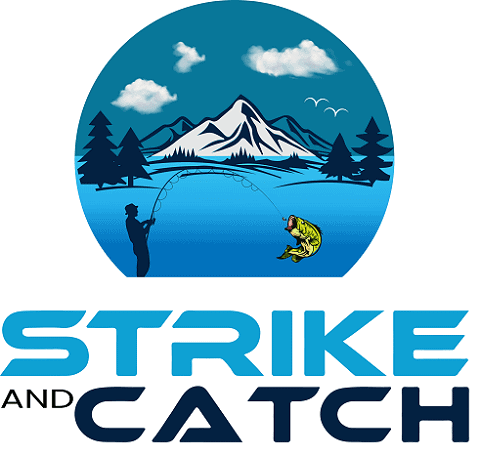Muskies are apex freshwater predators and big and fiercely fighting game fish that are extremely popular among anglers in North America.
Make no mistake, though; muskies aren’t caught easily! So optimizing each fishing trip and trying to fish in optimal conditions is crucial.
Weather patterns can impact the fish in various ways, and knowing what weather conditions muskies prefer can make a lot of difference on the water!
The optimal weather conditions for musky fishing include colder to moderate temperatures of 50 and 70°F, falling barometric pressure, moderate southern or western winds, and an overcast sky. Light rain can also be advantageous when fishing for muskies.
Keep reading this article and find out about favorable weather conditions for musky fishing and when you should avoid fishing for these incredible predators.
PRO TIP: Need new gear for your next musky fishing adventure? Then check out this quality equipment on Amazon.
It’s very cost-effective, durable, and can handle any trophy musky with ease!
Best Weather Conditions for Musky Fishing

Like every fish species, muskies (muskellunge) are affected by different weather conditions, and if you’re fishing in the right weather, you can increase your chances of catching fish!
Of course, that’s easier said than done! After all, we’re talking about the fish of a thousand casts.
Even in the best possible conditions, it’s often still difficult to have success when muskie fishing. But why not optimize as much as you can, right?
While you can’t control the weather, what you can do is pick days with favorable weather conditions.
Not only can this lead to potentially more hookups, but it’ll also boost your confidence as an angler. And trust me, if you’re targeting muskies, you need a good portion of confidence on your plate!
Let’s take a closer look at those favorable weather conditions for musky fishing, then!
Temperature
Like northern pike, muskies are cold-water predators that prefer cooler to moderate water temperatures. For musky fishing, the optimal temperature range is between 50 and 70°F. Not too cold and not too warm, in other words!
Colder water holds higher concentrations of dissolved oxygen. Big apex predators, like muskies, use up a lot of energy when hunting for prey and hence have a higher oxygen intake.
When the water gets too warm, those oxygen levels decrease, and the fish become fairly inactive, as they have to preserve their energy.
On the other hand, very cold water has a lot of oxygen in it, but as the fish’s metabolism slows down, there isn’t much action going on either!
That’s why a lower-to-moderate temperature range is considered the best for musky fishing. It holds enough oxygen for the fish, and the musky’s metabolism is in full swing. Meaning: hungry predators!
Of course, it is definitely possible to catch muskies in both lower temperatures than 50 and higher temperatures than 70°F! After all, muskies caught in mid-summer or through the ice (where allowed) aren’t that uncommon.
It might not be as easy, but catching muskies in cold water temperatures of around 40°F can certainly be done!
And while they’ll also feed in very warm water temperatures, it’s generally advised to seize all musky fishing if the water temperature goes beyond 80°F!
Numerous studies have shown that the fish’s mortality rate can increase drastically when caught in too-high water temperatures.
So while fishing around 70°F is fine and 75 to 80°F is acceptable, targeting muskies in water temperatures of 80°F and above is a big no-no. Please remember that when you head out during summer!
Barometric Pressure
Barometric pressure is another factor that can affect fish behavior, even though it usually doesn’t have a significant influence.
When it comes to barometric pressure, big predators like muskies tend to be more active when the barometer is falling or when a steady low-pressure system is present.
High-pressure systems, or a rapidly changing barometric pressure, on the other hand, can turn the bite off completely.
But again, this usually isn’t a major factor, and I think it has more to do with the accompanying weather conditions that low-pressure systems bring.
So let’s also discuss wind and clouds to get a more complete picture!
Wind
Winds from the south or southwest often accompany a low-pressure system, and I’d say that these are, by far, the best wind directions you could hope for when fishing for musky (or any other species, really).
You know the saying: Winds from the east, fish bite the least. Winds from the west, fish bite the best.
Add north to east and south to west, and you got yourself a pretty accurate rule of thumb!
But are winds in general good for musky fishing, or is it better to have a calm water surface and no wind at all?
Light to moderate winds are always a good thing when targeting muskies! They break the water’s surface, meaning lower visibility underwater, as less day or sunlight can penetrate it.
Like northern pike, muskies are primarily sight feeders, but too much visibility and water clarity can easily spook them!
Additionally, a disturbed and moving surface means more plankton is floating around, which can attract large numbers of bait fish. These, in turn, will attract the bigger predators.
On the contrary, strong winds aren’t very favorable, as they often make locating and fishing for musky quite tricky.
But a light to moderate breeze is always great for musky fishing!
Sun and Clouds
The last pieces of the musky weather puzzle include the sun, the clouds, and the sun and daylight factors.
Too much visibility and light aren’t all that great for muskie fishing, so it can be a good idea to avoid super sunny days and instead focus on days with an overcast sky.
For one thing, clouds usually mean moderate temperatures, a falling barometric pressure, and, often, warmer winds from the south or west.
And as I’ve already mentioned, these are all favorable conditions for musky.
For another, the sun’s weakened light penetration typically results in less careful muskies, as they can use the cover provided by the clouds for their advantage when hunting.
So, not only will you be fishing in optimal weather conditions, but the muskies might also go for your baits much more aggressively and with greater confidence! This holds especially true in lakes with very creal water.
RELATED ARTICLE: Musky Fishing in Clear Water (Best Tactics)
Is Rain Good for Musky Fishing?

When fishing in the above-described conditions, the occasional rainfall isn’t all that unusual. After all, low-pressure systems and heavy cloud covers are known to produce rain though and then.
So is rain a bad thing? Do you have to stop fishing and head home when it starts raining? Not at all!
Heavy rain is something you should avoid for obvious reasons, but a light to moderate drizzle can often turn on the bite and produce plenty of fish!
Rain affects water and fish in various positive ways! For one thing, it breaks and disturbs the surface, creating lower visibility underwater and more cover for the fish.
PRO TIP: This also means that the fish can often be found in shallower water during or right after rain!
For another, rain means even more oxygen in the water, which can turn the fish on and send them into a feeding frenzy, especially after warm and dry weather.
So if there have been several days of hot weather with lots of sun, and then the weather suddenly turns, and rain is heading your way, make sure to be on the water (as long as the rain is light to moderate) because chances are good that you’re going to have a very productive fishing trip!
Do Muskies Bite in Cold Weather?

While you can expect the best results in lower to moderate temperatures, it’s possible to catch muskies in cold weather conditions as well!
Spring and fall are usually considered the best times of year for musky fishing, including early spring and late fall, when water temperatures are generally considerably lower!
Interestingly, plenty of big fall muskies are caught right before a cold front arrives, which goes against most of the late spring, summer, and early fall fishing rules.
My guess is that the fish sense the coming cold and try to feed as much as possible before the conditions change!
So if you can be out on the water before that cold front hits, it’s game on, especially if you’re after a trophy ski!
On the other hand, really cold weather and extremely low water temperatures just above freezing are generally not great for musky fishing and should be avoided, no matter the time of year!
Sub-zero air temperatures, extremely harsh winds from the north or east, or rain or snow storms aren’t optimal for you or the fish. And it’s often best to sit those out and wait for better weather to roll in.
RELATED ARTICLE: How to Catch Musky in Muddy Water?
Do Muskies Bite in Hot Weather?
I wanted to cover this last question a little more in-depth, as it’s such a widely-debated topic among musky anglers in North America.
Do muskies bite in hot weather and high water temperatures? Absolutely! Should you target them in water temperatures of 80°F or above? In my opinion, definitely not!
The fact of the matter is that both musky and northern pike are cold-water predators! Their activity slows down significantly during high summer, and if caught, they recover slowly.
In the worst case, catching these species in too-warm water can kill them!
Many studies have shown this, and there are lots of fishing pros out there stressing this fact.
If it’s too hot for comfort for you, it’s definitely too hot for the muskies (and pike) as well! I find that to be a good rule of thumb.
If you absolutely must target them during the hot days of summer, please do so during the very early and very late hours of the day, when air and water temperatures are somewhat lower.
Generally speaking, though, the right thing to do is to avoid fishing for these apex predators if the weather is too hot. Period!
Essential Gear Tips
If you’re looking for solid and reliable musky fishing equipment, these tips might be useful for you.
The following tackle is of top quality and sells at a very reasonable price on Amazon:
Rod: St. Croix Mojo Musky Casting Rod
A versatile and beautifully made medium-heavy 8 to 9′ baitcasting rod that’s perfect for big predators. Has an awesome balance, action, and sensitivity. An excellent musky rod with a dream-like performance!
Reel: Abu Garcia Revo Toro Beast Baitcaster
An affordable, high-performance baitcasting reel with amazing precision. Casts super smoothly and will last you forever! Makes for the perfect muskie combo together with the St. Croix Mojo rod.
Line: Sufix 832 Advanced Superline Braid
One of the best braids available today. Zero stretch, great feel, and immense strength make this line the perfect pick for muskies in both open and snaggy waters. Put on a 65 or 80lb test, and you’re good to go!
Related Articles
- Can You Catch Muskies at Night?
- Best Fishing Nets for Musky
- What Is the Best Weather for Pike Fishing?
Featured image courtesy of Joe Rennie

